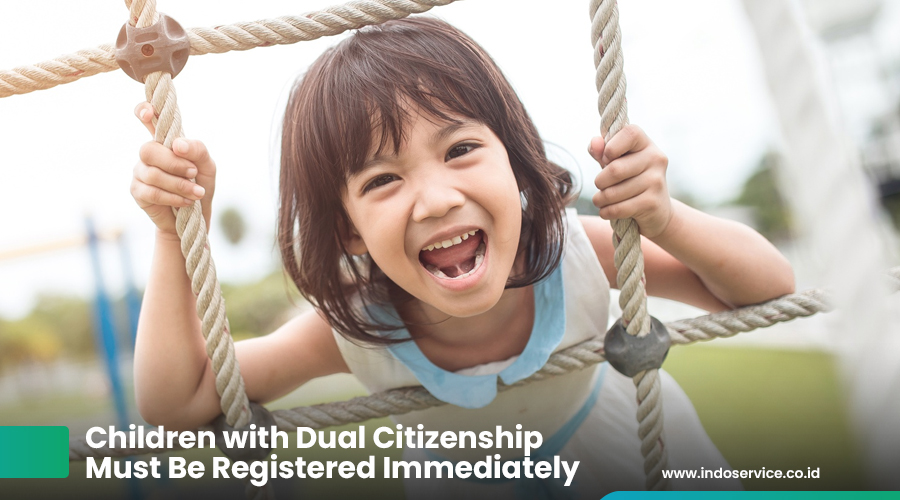Children with Dual Citizenship Must Be Registered Immediately – Currently mixed marriages are widely practiced by Indonesian people, whether they live in Indonesia or live abroad. With so many mixed marriages occurring in Indonesia, legal protection for mixed marriages should be properly accommodated in Indonesian legislation. An issue that is vulnerable and often arises in mixed marriages is the child’s citizenship. The old citizenship law adhered to the principle of single citizenship, so that children born from mixed marriages could only have one citizenship which in the law stipulated that the nationality of the father must be followed. This arrangement creates problems if the parents separate, the mother will have difficulty to taking care for her child who is a foreign citizen.
In determining a person’s nationality, it is known that there is a principle of citizenship based on birth and a principle of citizenship based on marriage. In determining citizenship based on birth, there are two principles namely Ius Soli and Ius Sanguinis. Ius means law or proposition, Soli comes from the word Solum which means country or land and Sanguinis comes from the word Sanguis which means blood. Ius Soli mean states that a person’s citizenship is determined by the place where the person was born. Ius Sanguinis mean states that a person’s citizenship is determined based on that person’s descent.

Children with dual citizenship who are the result of mixed marriages between Indonesian citizens and foreigners must be immediately registered with the government through the immigration office and have the right to choose their citizenship after turning 18 years old or no later than three years after reaching the age of 18 years. They can choose whether they want to become Indonesian citizens or retain the citizenship of their father or mother. It aims to give children control over their citizenship when they are old enough. This is very important so that children resulting from mixed marriages have clear citizenship status and avoid losing their citizenship (statelessness).
Dual citizenship provisions
Matters regarding citizenship have been regulated in Law no. 12 of 2006, where it is stated that children born on and after 1 August 2006 to an Indonesian citizen couple or one of whose parents is an Indonesian citizen can apply for limited dual citizenship with the following conditions:
- Children born from a legal marriage to an Indonesian citizen father (WNI) and a foreign citizen mother (WNA);
- Children born from a legal marriage of a foreign citizen father (WNA) and an Indonesian citizen mother (WNI);
- Children born outside a legal marriage to a foreign citizen (WNA) mother who is recognized by an Indonesian citizen (WNI) father and the recognition is made before the child is 18 (eighteen) years old or unmarried;
- Children born outside the territory of the Republic of Indonesia to fathers and mothers who are Indonesian citizens (WNI), which due to the provisions of the country where the child is born grants citizenship to the child;
- Children of Indonesian Citizens (WNI) who are born outside of a legal marriage, are not yet 18 (eighteen) years old and are not yet married, are legally recognized by their Foreign Citizen (WNA) Father;
- Children of Indonesian Citizens (WNI) who are not yet 5 (five) years old, are legally adopted as children by Foreign Citizens (WNA) based on a Court Determination.
Procedures for registration of children
- Registration of Children with Dual Citizenship must be registered by parents or guardians
- Registration is submitted to the Head of the Immigration Office whose working area includes the residence of the Dual Citizenship Child
- Registration of a Child with Dual Citizenship is submitted in writing in Indonesian containing the full name of the Child with Dual Citizenship, place/date of birth, gender, address, name of parents, nationality of parents; and parents’ marital status
- Registration by filling in the form and attaching original documents and photocopies: a. child’s birth certificate; marriage certificate, marriage book, or parents’ divorce certificate; child’s foreign nationality passport for those who have it; father’s or mother’s foreign nationality passport for children who do not have a foreign nationality passport; and 4 (four) recent color photographs of Dual Citizenship Children measuring 4 x 6 cm (four by six centimeters).
- The Registration Receiving Official receives and checks the form and completeness of the documents
- If declared complete, the Registration Receiving Officer receives and checks the form and completeness of the documents
- The Registration Receiving Official verifies the registration files
- If declared correct and valid, the Registration Receiving Official shall record in the register book the service identity code, service unit code, service serial number, and service year code
- Head of the Immigration Office, Head of Representative of the Republic of Indonesia, or Immigration Official issues proof of registration within (3) working days.

Children are legal subjects who are not yet capable of carrying out legal actions themselves, so they must be assisted by parents or guardians. The regulation of the legal status of children resulting from mixed marriages in the new Citizenship Law provides positive enlightenment, especially regarding the relationship between children and their mothers, because this new law allows limited dual citizenship for children resulting from mixed marriages.



0 Comments